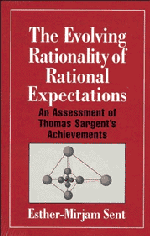5 - Accommodating Learning
Published online by Cambridge University Press: 18 December 2009
Summary
Why wait for Science to supply the how
When any amateur can tell it now?
The way to go away should be the same
As fifty million years ago we came –
If anyone remembers how that was.
I have a theory, but it hardly does.
Robert Frost, Why Wait for ScienceThis chapter contains a case study of Sargent's changing attitude toward learning. Rather than looking at his accomplishments from the perspective of orthodox philosophy of economics or conventional history of economic thought, I am searching for the story Sargent is likely to have told about how he arrived at the idea of learning with artificial intelligence and what resistances he had to overcome to put his interpretation of this concept to use. Whereas this type of analysis has been used in the previous three chapters in the discussion of Sargent's different interpretations of rational expectations, it is employed here to analyze how Sargent moved away from rational expectations. In fact, Sargent (1993) finally made a “call to retreat from … rational expectations … by expelling rational agents from our model environments” (p. 3) and “to create theories with behavioral foundations by eliminating the asymmetry that rational expectations builds in between the agents in the model and the econometrician who is estimating it” (pp. 21–2). Before discussing this move, I illustrate in section 5.1 how Sargent's social environment in the late 1980s was shaped by his involvement with the Santa Fe Institute.
- Type
- Chapter
- Information
- The Evolving Rationality of Rational ExpectationsAn Assessment of Thomas Sargent's Achievements, pp. 124 - 162Publisher: Cambridge University PressPrint publication year: 1998

